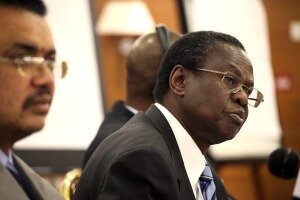`We became beggars'
 Dr Francis Omaswa |
This is the 12th in a series of posts from the Ministerial Leadership Initiative for Global Health's Learning Collaborative Forum in Ethiopia. On Monday we will post two wrap-up pieces from the conference, and later this week we'll continue with out Motivators series from health leaders in Ministries.
At the MLI Learning Collaborative Forum in Ethiopia, a four-day event that attracted senior officials from five Ministries of Health, one of the most poignant moments came early on the last day in opening remarks by Dr. Francis Omaswa.
Peggy Clark, vice president of policy programs at the Aspen Institute and executive director of Aspen Global Health and Development, introduced Omaswa by not only describing his work as a former director-general of Ministry of Health in Uganda and founding director of the African Center for Health & Social Transformation, but also that he spent five years as a doctor in a remote mission hospital in Uganda nearly three decades ago.
Omaswa, a senior MLI adviser, used his breadth of experience to give a sweeping view of Africa, country development, and the current trend of expansion and progress.
But he minced no words in talking about the difficulties in the past. In many countries, he said, the post-independence era initially went well, but in the 1980s, he said, “it changed.”
‘Africa on its knees’
“We in Uganda had Idi Amin, but even African countries without Amins didn’t escape trouble,” he said. “In decline, Africa ended up on its back and on its knees. But the last decade, 15 years, maybe a little more, there is a new Africa, a much more hopeful Africa than the ones on its knees. In Addis, in Angola, in Senegal, you hear the same story. You also hear it in Mali, Benin, Dar es Salaam, among other places, of the past few years that our GDP is growing at 5 or 6 percent. That is the Africa we have now. We have a chance – a second chance – to take over.”
Then he talked about country ownership of health programs, a central theme of the MLI forum.
“We have been looking at this topic for the last two or three years very closely,” he said. “There is no issue about definition, about what country ownership is, it is all well articulated with the Paris Declaration, the Accra additions to it. There are roles for countries, roles for partners. When we talk about country-led, it is those countries where the governments are strong, they are making the most progress.”
The important roles of donors, civil society
Omaswa said that strong governments were critical, but “governments alone are not enough. Governments need to provide space for their people, for civil society organizations. We need in Africa to have space provided for development partners as well. Because of that decline phase, we were on our knees, we became beggars, we did not have enough money on our own to find our way out.”
Now, he said, donors need accountability from recipient governments, and they should be able to press governments about reaching pre-determined goals. “Our friends supporting us have to account to their own people, they have to show the money they give gives results,” Omaswa said.
“But they also have to listen to us. If a country is clear, donors will come,” he said. “If you are strong and clear and you know how to articulate things, normally you find your interests with the donors are the same. It is this spirit in which I am really please to work with MLI. MLI is acting as a catalyst for countries. It gives us an opportunity to discuss more and understand each other better as to how we will want to support country leadership.”
Live-blog from Ethiopia:
Part 1: MLI Live-blog from Addis Ababa
Part 2: ‘Its Always Good to Think Big’
Part 3: Mali’s Path to Community Health Insurance
Part 4: ‘A New Dawn’ in Health Care in Sierra Leone
Part 5: Want to Bargain? The Nepalis can Help
Part 6: From Mali to Nepal: The Trail of a Negotiator
Part 7: Ethiopia’s New Plan: ‘It’s going to Really Improve this Place’
Part 8: Ethiopia and the Importance of Family Planning
Part 9: Gang of Four: Table Talk with Reproductive Health Directors
Part 10: Ethiopia’s Tedros: Four Steps to Owning Health Programs
Forum Wrap-up, Part 1: Marty Makinen and Amanda Folsom
Forum Wrap-up, Part 2: Rosann Wisman
Photo Credit Dominic Chavez
Keyword Search
MLI works with ministries of health to advance country ownership and leadership. This blog covers issues affecting the ministries and the people they serve.
Connect with Us
![]()
![]()
Categories
Blogs We Like
- Africa Can End Poverty
- Africa Governance Initiative
- Behind the Numbers
- CapacityPlus
- Center for Global Health R&D Policy Assessment
- Center for Global Development: Global Health Policy
- Center for Health Market Innovations
- Global Health
- Global Health Hub
- Global Health Impact
- The New Security Beat
- PAI Blog
- RH Reality Check
- Save the Children
- Transparency and Accountability Program
Contact Us
Please direct all inquiries to
